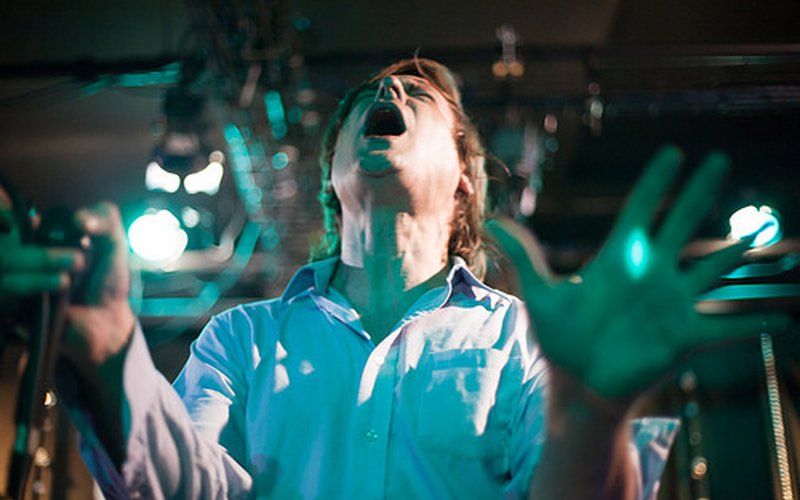
All photos and review by Bebe Besch (view set)
Five years. John Maus has remained silent for five years, despite some intermittent tweets that could have easily been handled by management. A couple of weeks ago, Maus released a teaser video, hinting at the possibility that new music might be coming. He released this video in tandem with his current U.S. tour, which took off with a few East Coast dates after a private pilot basement show in Como, Minneapolis, including this show in New Jersey at Monty Hall, the venue operated by fellow listener-powered radio station WFMU.
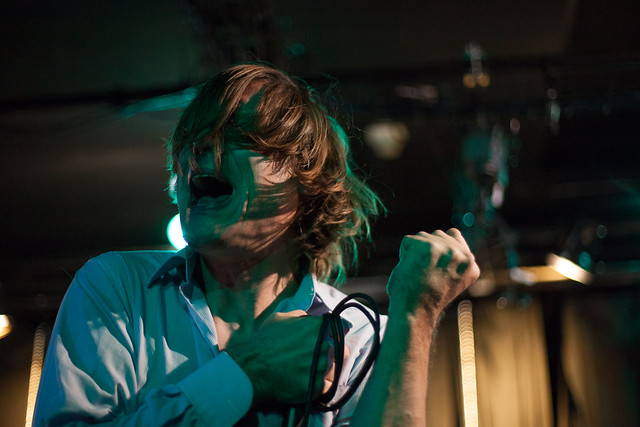
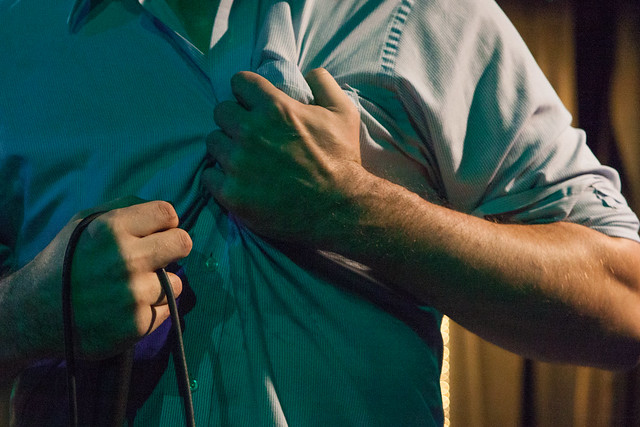
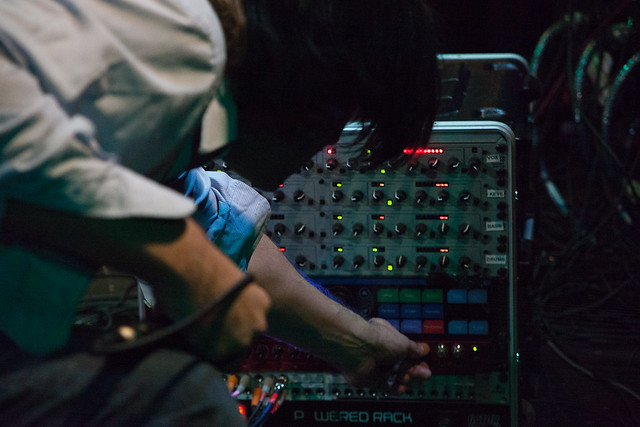
Maus is known for the intensity of his one-man sets, where he usually just screams over his own melancholic pop recordings -- essentially performing an emotional exorcism on himself. He tears at his eyeballs, pulls his hair, grabs for his heart, and tugs at the little fat on his body through his signature button up shirt. It all feels overwhelmingly intimate, juxtaposing against his wild combination of '80s-style synthesizers and melodies, random guitar riffs, and the occasional whisper-yelling into the microphone.
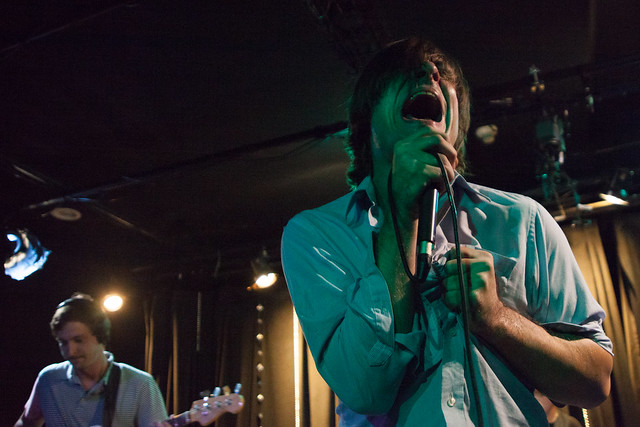
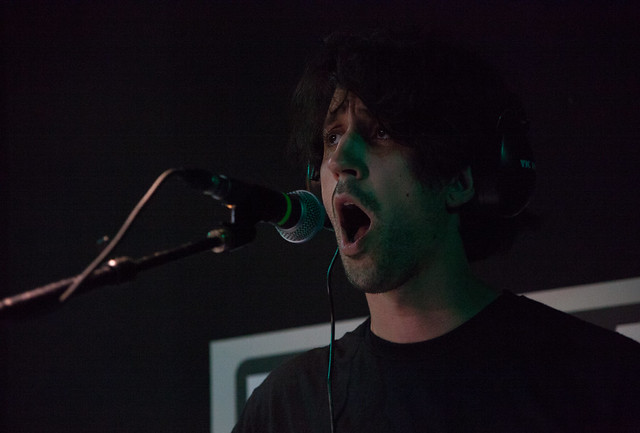
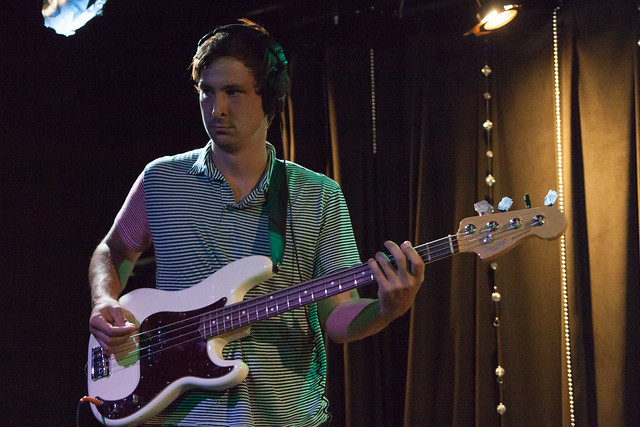
Touring alone can be isolating, and in the past five years, Maus has settled on a less lonesome touring path this time around. A bassist, drummer, and keyboardist all took the stage shortly before John Maus himself came out and perched at the front of the stage, kneeling, and already looking spent.
Seconds later Maus was vertically mobile, jumping in place and punching himself ferociously in the head to “Castles in the Grave.” The sold out Monty Hall had awoken with the sudden eruption of Maus’ energy; a feral spirit previously lying dormant and untapped, hidden away for half of a decade, was released.
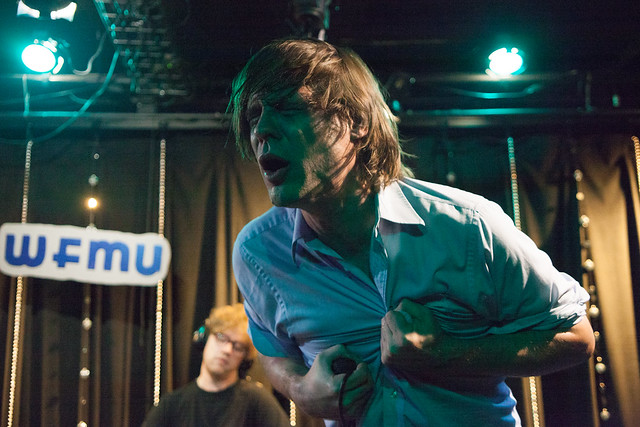
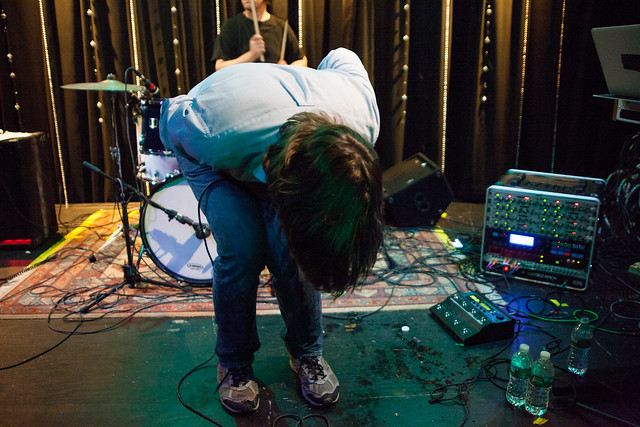
Working through many tracks off Maus’ latest official release, We Must Become the Pitiless Censors of Ourselves, like “Quantum Leap,” “And the Rain,” and “Streetlight,” Maus stomped in his center stage area, often stopping to extend his arms out, reaching towards the crowd while bellowing tormented cries. The crowd, in return, always replies back with the same harrowing cry. This game of tug of war is a Maus staple. The intensity of the room further soared during “Cop Killer,” a lyrically cryptic and thematically controversial song: “Cop Killer / Let’s kill the cops tonight / Cop Killer / Kill every cop in sight,” and the beloved song “Rights for Gays,” which has become an unspoken anthem for Maus fans.
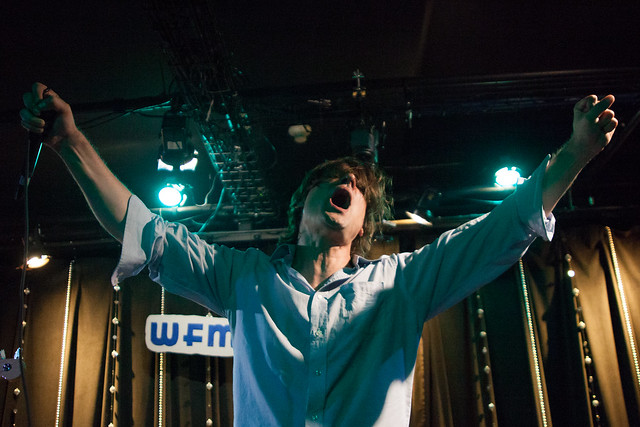
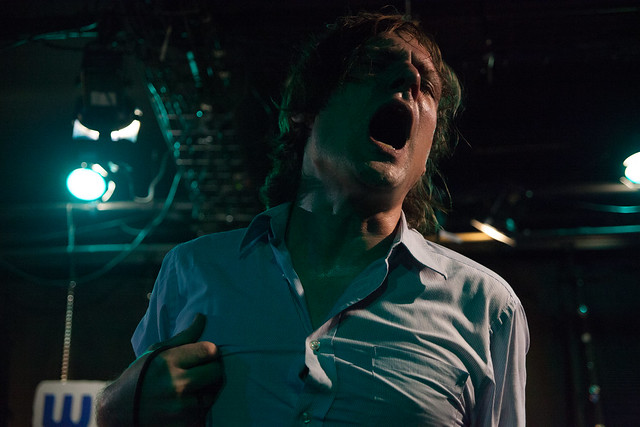
The Monty Hall set lasted for about 45 minutes -- significantly extending the show by about 15 minutes more than past Maus sets (awarding us about six more songs). The backing band appeared to be exactly what Maus needed -- support. Technically, the sound is an obvious improvement over his solo performances, specifically when the drums kick in, pulsing along with Maus. Otherwise, there is not much harmonious change. The band members’ presence is not discounted or unnoticed, however. The performance is still the familiar John Maus experience unfolding, but this time he has a few familiar faces to glance at between songs for some grounding. A few times throughout the night, Maus turned, yelling directly towards his keyboardist, Luke Darger, an interaction previously reserved for only Maus and the audience.
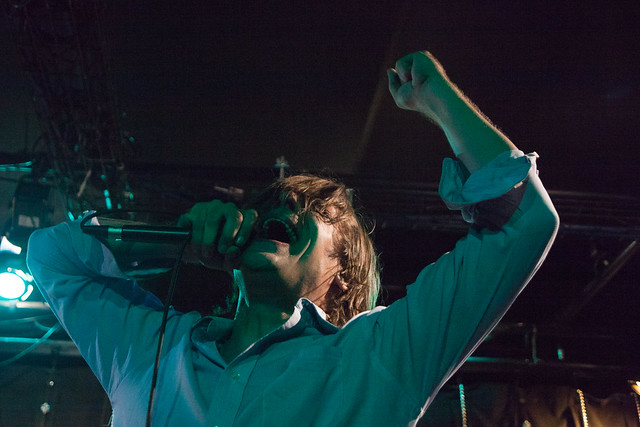
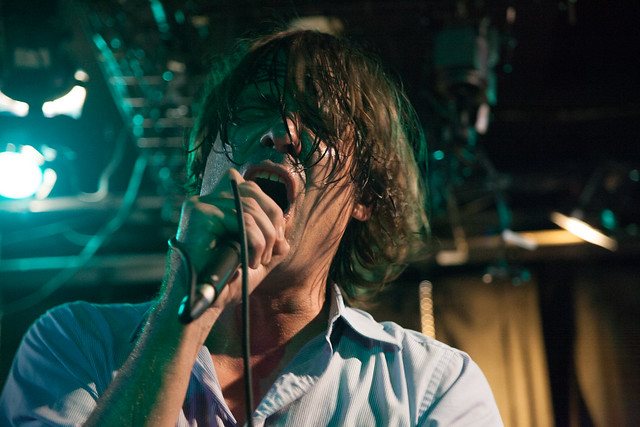
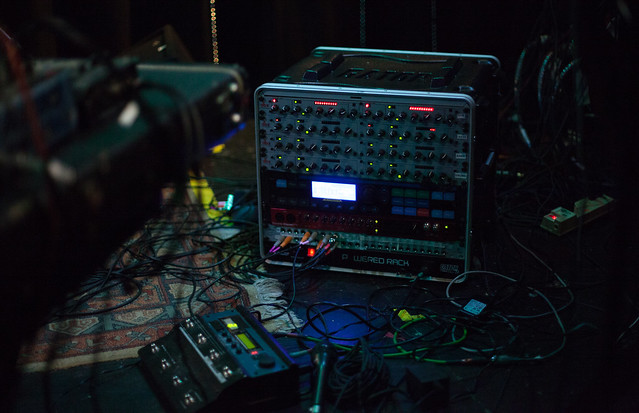
Two new songs wrapped up the entirety of the main set, including more vocal fury than the songs preceding them. With an aggressive toss of the microphone, Maus and co. left the stage only to be drawn back out by the crowd for an encore of “Believer,” which nearly did not happen. As the track begun, Maus was spending a long time fiddling with the settings of his audio rack in the back corner of the stage as he did throughout the night. This song felt less polished than the others and was reserved apparently for only the possibility of an encore. 30 seconds into the song, Maus almost gave up on the track and sharply turned to leave the stage, notably upset with the sound. After a few positive nods of reassurance in his direction from his band mates, he returned back to the front of the stage and restarted the song for a triumphant goodbye.
Drenched from the tip of his head to his waist, Maus had successfully returned. He has re-emerged with band mates, who clearly have helped settle some of his immediate anxieties. He has a few new songs ready for sharing, but insecurity lies below the surface always. The quest for perfection is a difficult struggle, and Maus wears his on his sweaty sleeves. A visible toll is taken on Maus during and after his live performances, even while receiving praise. Hopefully, this toll is met with an equal benefit on Maus’ end. There are endless routes Maus could take us down next, and fans will be waiting patiently and eager to follow.
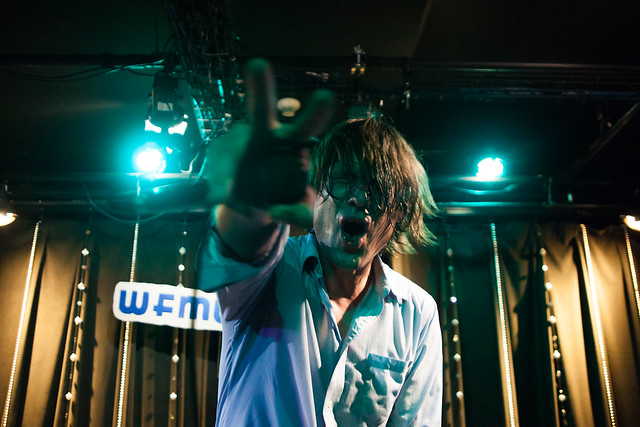
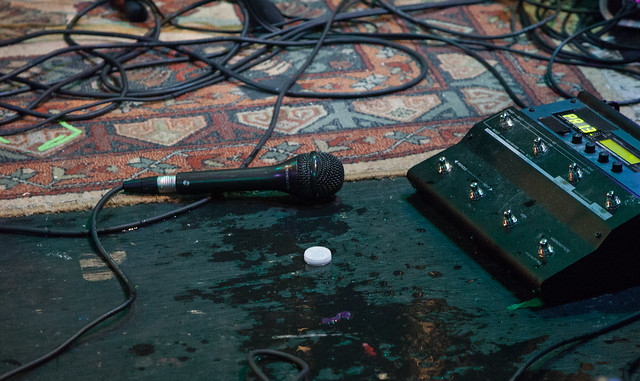
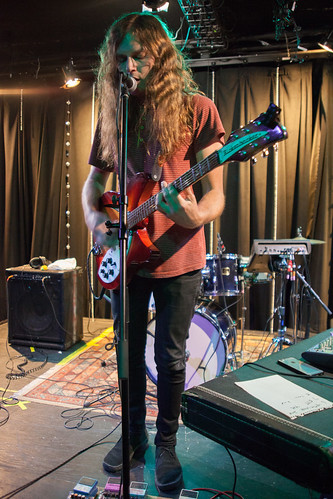
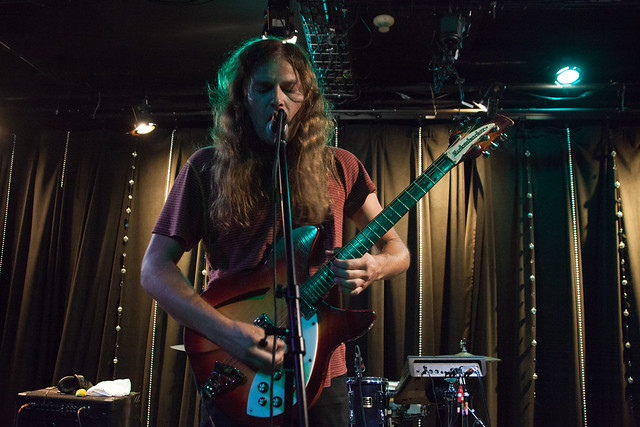
Opening the quaint Monty Hall for the night was Gary War, who has much in common with his tour mate John Maus. War was also previously a member of Ariel Pink’s band, and his performing set up is reminiscent to John Maus’ pre-band mates. War took the stage solo with just a guitar, some pedals and sampler to sort through his different songs for the evening. His personality was much more subdued, which balanced out his noisy-psychedelics ringing through the venue. Occasionally War would flip his wavy locks, sometimes getting them caught on the microphone he was leaning into. War’s extensive opening performance ended abruptly when he cut the sound and offered a simple “Thanks,” before disappearing from sight.
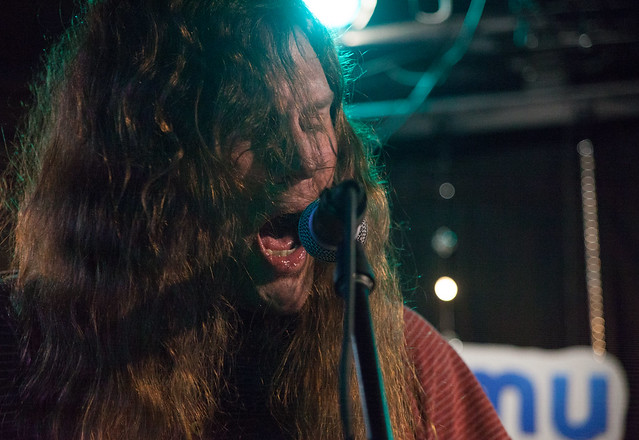
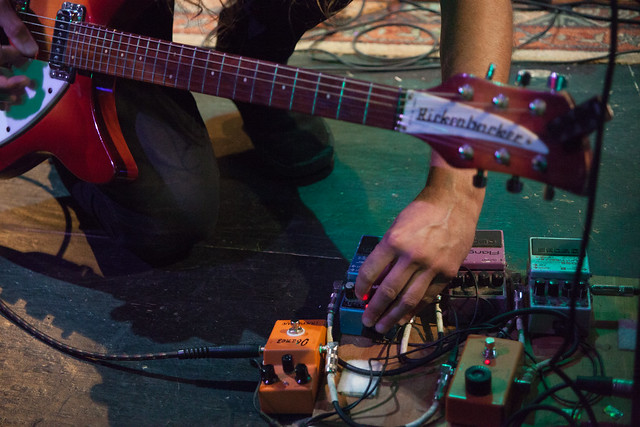
Review by Clare McGrane, DJ assistant for Wo'Pop on KEXP
The last time I saw Sylvan Esso was over two years ago, in a much smaller room about 2,500 miles away. It was a cold January night in Charlotte, North Carolina (my hometown), about three hours outside of Sylvan Esso’s hometown of Durham. It was just a few months after the release of their debut sel…